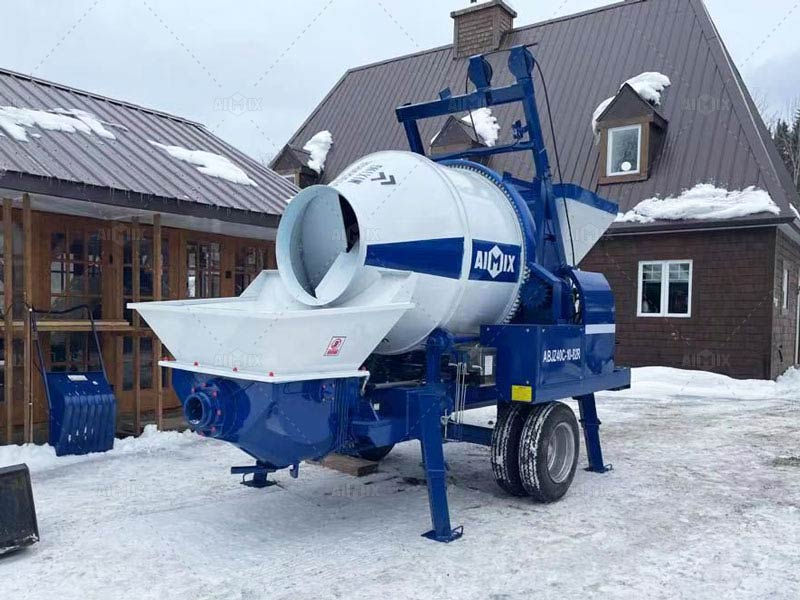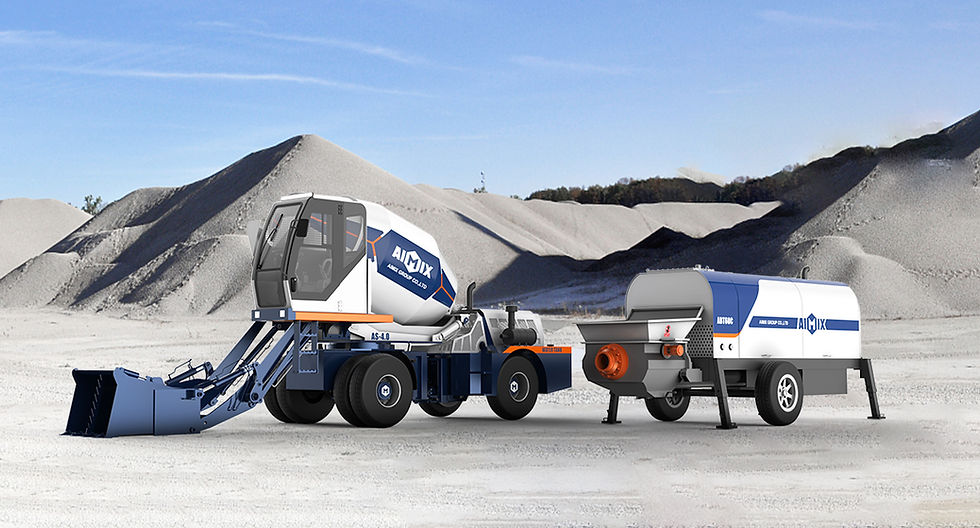What are the Advantages of Using a Concrete Mixer Pump Over Traditional Methods?
- aimixindonesia5
- Jun 19, 2024
- 4 min read
In the fast-paced construction world, efficiency and effectiveness are key. For tasks involving concrete, a concrete mixer pump stands out as a modern solution. This equipment combines the functions of a concrete mixer and a pump, offering substantial benefits over traditional methods. From enhancing productivity to reducing labor costs, a concrete mixer pump can transform how you approach construction projects.

Efficiency and Speed
Traditional concrete mixing and pouring methods often involve multiple steps and extensive manual labor. Workers mix concrete, transport it, and pour it into forms. This can be time-consuming and prone to delays. In contrast, a concrete mixer pump integrates these steps. It mixes and pumps concrete in one continuous process. This results in faster project completion and less downtime. Imagine pouring concrete directly where needed without waiting for multiple stages of preparation. The efficiency of a concrete mixer pump can significantly reduce the time required for projects.
Cost-Effectiveness
Using traditional methods often requires more manpower and machinery. You need separate mixers, transport equipment, and labor for each stage. This increases operational costs and complexity. A pompa mixer beton, or concrete mixer pump, consolidates these tasks. This reduces the need for additional equipment and labor. Consequently, you save on operational and labor costs. Moreover, the precision of a concrete mixer pump minimizes material waste, leading to further cost savings. The integration of mixing and pumping functions ensures that you only use the necessary amount of concrete.
Precision and Quality Control
Traditional concrete pouring can sometimes lead to inconsistencies. Manual mixing and transportation might affect the concrete's quality. This is particularly true in large projects where timing and consistency are crucial. A concrete mixer with pump ensures a continuous and controlled flow of concrete. This results in a more consistent mix and pour quality. The equipment allows precise control over the concrete's consistency and placement. This ensures better structural integrity and quality of the finished product.
Labor Savings
One of the significant advantages of a concrete mixer pump is the reduction in labor requirements. Traditional methods require a larger workforce for mixing, transporting, and pouring concrete. A beton pump simplifies these processes, reducing the need for extensive manpower. This not only cuts down on labor costs but also reduces the potential for human error. Automated mixing and pumping lead to more consistent results and fewer mistakes. The equipment’s user-friendly design makes it easier to operate, even with a smaller crew.

Versatility in Applications
Concrete mixer pumps are incredibly versatile. They are suitable for various construction applications, including residential, commercial, and industrial projects. Whether you are working on a high-rise building, a bridge, or a small residential project, a concrete mixer pump can adapt to different needs. This versatility makes them a valuable asset in any construction toolkit. In regions like Indonesia, where diverse construction needs arise, a concrete pump Indonesia offers the flexibility to handle various project demands efficiently. The ability to handle different types of concrete mixes and construction environments further enhances their utility.
Improved Safety
Safety is a critical concern in construction. Traditional concrete handling methods can pose several risks, including manual lifting and handling hazards. A concrete mixer pump reduces these risks by automating the mixing and pumping processes. This minimizes manual handling and reduces the likelihood of accidents. Additionally, the equipment is designed to operate efficiently in various site conditions, enhancing overall safety. By streamlining concrete handling, the risk of injuries related to lifting and transporting concrete is significantly reduced.
Environmental Benefits
Concrete mixer pumps also offer environmental advantages. Traditional methods can lead to excess material waste and inefficient resource use. A pompa beton helps in precise concrete placement, reducing waste. Moreover, the equipment’s efficiency means less fuel consumption and fewer emissions compared to using multiple machines. This makes concrete mixer pumps a more environmentally friendly choice. Efficient concrete use and reduced waste contribute to a more sustainable construction process. As environmental regulations become stricter, the adoption of more efficient equipment like concrete mixer pumps can help meet these standards.
Reduced Maintenance and Operating Costs
Maintaining multiple pieces of equipment for traditional concrete handling can be costly and time-consuming. A concrete mixer pump, being a consolidated piece of machinery, reduces maintenance needs. Its integrated system simplifies maintenance and lowers operating costs. Regular maintenance of one machine is more manageable and less expensive than maintaining several. The streamlined design also leads to fewer breakdowns and longer operational life. By investing in a concrete mixer pump, you can benefit from lower long-term maintenance costs and enhanced reliability.

Conclusion
In conclusion, using a concrete mixer pump offers numerous advantages over traditional methods. From efficiency and cost savings to improved quality and safety, it stands out as a superior option for concrete handling. Whether you are in Indonesia or any other region, adopting a concrete mixer pump can transform your construction processes. For those seeking a reliable and efficient solution, consider exploring the options provided by AIMIX. Investing in advanced equipment can elevate your construction projects and yield significant benefits in terms of time, cost, and quality.



